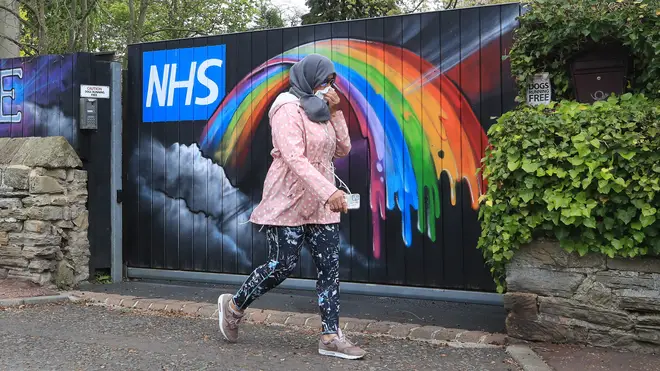
Matthew Wright 7am - 10am
29 April 2020, 15:34

A further 601 people have died from coronavirus in hospitals across the UK, the latest figures show.
The figure brings the UK total to over 22,000 coronavirus deaths, and it is expected to rise sharply later when deaths outside a hospital setting are added.
NHS England announced 445 new deaths of people who tested positive for Covid-19, bringing the total number of confirmed reported deaths in hospitals in England to 19,740.
The figures include a patient aged 14 with no known underlying health condition.
A further 73 people have died after testing positive for coronavirus in Wales, taking the total number of deaths there to 886, Public Health Wales said.
READ MORE: the latest coronavirus updates live
Scotland reported a further 83 deaths bringing the total in hospitals to 601, and the full total so far of 22,370 is expected to rise considerably later.
Figures from Northern Ireland are not yet available.
Prime Minister Boris Johnson is still expected to set out further details of his coronavirus plan in public later this week, following the birth of his son.

It's too soon to make international coronavirus death comparisons
Downing Street said Thursday's Cabinet meeting would look at the "coronavirus response in general" but is not expected to make decisions on easing lockdown measures.
The Prime Minister's official spokesman said advice on the issue from the scientific advisory group for emergencies (Sage) had not yet been received.
The current social distancing measures have to be reviewed by May 7 and ministers have said the lockdown would only be lifted if the five tests set by the Government are met.
The Prime Minister's spokesman said there had been no change in the tests, insisting they remained the same as set out by Dominic Raab earlier this month.
The UK will also study the situation in countries including Germany when it comes to lifting lockdown, amid reports that restrictions there could be tightened again to prevent another rise in cases.
The Prime Minister's spokesman said: "We are watching how countries across the world respond to coronavirus and we are obviously studying steps which they are taking in relation to relaxing their own social distancing measures and the impact that's having.
"Exactly as you would expect, we want to base our own decision on the best available information and experience."
Under the UK Government's fifth test, the lockdown cannot be lifted if there is a risk of a second wave overwhelming the NHS.
Asked if a smaller second wave would be acceptable, the spokesman said: "We have stressed repeatedly the importance of ensuring that we don't return to an exponential growth in the spread of the disease."
Asked whether contact with social "bubbles" of friends and family would be considered under relaxed lockdown measures, Downing Street said the Government was "very alive" to the risks of isolation.
The Prime Minister's official spokesman said: "We have said that there is extensive work going on in Government to look at the next phase of the coronavirus response and we have also talked about how we could relax measures in some areas and toughen them in others.
Listen & subscribe: Global Player | Apple Podcasts | Google Podcasts | Spotify
"We're also very alive to the issue of social isolation and the need for mental wellbeing as people help us to deal with the spread of this pandemic.
"But in terms of specific details you will have to wait until such a time as we have the full medical and scientific advice and we are ready to set out what happens next."
Nearly a third of all care homes in England have reported coronavirus outbreaks, new data from Public Health England shows.
Some 4,516 homes have reported outbreaks since March 17 up until Monday this week - around 29% of the total care homes.
The region with the highest proportion of care homes reporting outbreaks is the North East, with 291 homes (38.7%) of the total in that area.
This was closely followed by the North West (36%) and London (33.2%), the Public Health England (PHE) figures show.